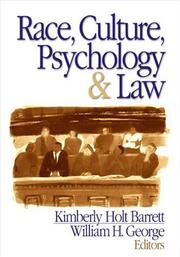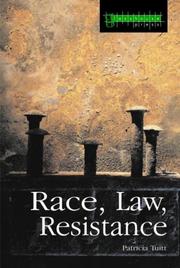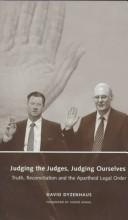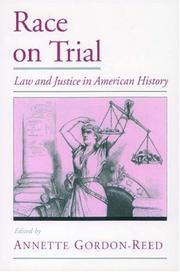| Listing 1 - 10 of 14 | << page >> |
Sort by
|
Book
ISBN: 1478024267 1478019638 Year: 2023 Publisher: Durham : Duke University Press,
Abstract | Keywords | Export | Availability | Bookmark
 Loading...
Loading...Choose an application
- Reference Manager
- EndNote
- RefWorks (Direct export to RefWorks)
"In Disappearing Rooms Michelle Castañeda lays bare the criminalization of race enacted every day in U.S. immigration courts and detention centers. She uses a performance studies perspective to show how the theatrical concept of mise-en-scéne offers new insights about immigration law and the absurdist dynamics of carceral space. Castañeda draws upon her experiences in immigration trials as an interpreter and courtroom companion to analyze the scenography-lighting, staging, framing, gesture, speech, and choreography-of specific rooms within the immigration enforcement system. Castañeda's ethnographies of proceedings in a "removal" office in New York City, a detention center courtroom in Texas, and an asylum office in the Northeast reveal the depersonalizing violence enacted in immigration law through its embodied, ritualistic, and affective components. She shows how the creative practices of detained and disappeared peoples living under acute duress imagine the abolition of detention and borders. Featuring original illustrations by artist-journalist, Molly Crabapple, Disappearing Rooms shines a light into otherwise hidden spaces of law within the contemporary deportation regime. Duke University of Press Scholars of Color First Book Award Recipient."-- Provided by publisher.

ISBN: 0761926623 1322419833 145226712X 9781452267128 9781452233536 1452233535 9780761926627 0761926631 9780761926634 9781322419831 Year: 2005 Publisher: Thousand Oaks (Calif.) : Sage,
Abstract | Keywords | Export | Availability | Bookmark
 Loading...
Loading...Choose an application
- Reference Manager
- EndNote
- RefWorks (Direct export to RefWorks)
The contributors examine the intersections of psychology & the law with regard to race & culture. As diversity gains increasing levels of respect in Western society, so this is becoming an evermore important topic of concern.
Book
ISBN: 9781478093565 Year: 2022 Publisher: Durham : Duke University Press,
Abstract | Keywords | Export | Availability | Bookmark
 Loading...
Loading...Choose an application
- Reference Manager
- EndNote
- RefWorks (Direct export to RefWorks)
"In Disappearing Rooms Michelle Castañeda lays bare the criminalization of race enacted every day in U.S. immigration courts and detention centers. She uses a performance studies perspective to show how the theatrical concept of mise-en-scéne offers new insights about immigration law and the absurdist dynamics of carceral space. Castañeda draws upon her experiences in immigration trials as an interpreter and courtroom companion to analyze the scenography-lighting, staging, framing, gesture, speech, and choreography-of specific rooms within the immigration enforcement system. Castañeda's ethnographies of proceedings in a "removal" office in New York City, a detention center courtroom in Texas, and an asylum office in the Northeast reveal the depersonalizing violence enacted in immigration law through its embodied, ritualistic, and affective components. She shows how the creative practices of detained and disappeared peoples living under acute duress imagine the abolition of detention and borders. Featuring original illustrations by artist-journalist, Molly Crabapple, Disappearing Rooms shines a light into otherwise hidden spaces of law within the contemporary deportation regime. Duke University of Press Scholars of Color First Book Award Recipient"--

ISBN: 9781904385066 1904385060 9781135311384 1135311382 1282376438 9781282376434 1283605023 9781283605021 9786612376436 6612376430 9786613917478 6613917478 1843146053 9781843146056 9781135311339 9781135311377 9781138160323 Year: 2004 Publisher: New York Routledge/Cavendish
Abstract | Keywords | Export | Availability | Bookmark
 Loading...
Loading...Choose an application
- Reference Manager
- EndNote
- RefWorks (Direct export to RefWorks)
Race, Law, Resistance is an original and important contribution to current theoretical debates on race and law. The central claims are that racial oppression has profoundly influenced the development of legal doctrine and that the production of subjugated figures like the slave and the refugee has been fundamental to the development of legal categories such as contract and tort.Drawing on examples from the UK and US legal systems in particular, this book employs a wide range of theoretical and disciplinary perspectives to explore resistance to racial dominance in modernity.

ISBN: 1901362949 0702149055 9780702149054 9781901362947 Year: 1998 Publisher: Oxford Hart
Abstract | Keywords | Export | Availability | Bookmark
 Loading...
Loading...Choose an application
- Reference Manager
- EndNote
- RefWorks (Direct export to RefWorks)
Discrimination in justice administration --- Judges --- Alcaldes --- Cadis --- Chief justices --- Chief magistrates --- Justices --- Magistrates --- Courts --- Race discrimination in justice administration --- Justice, Administration of --- History --- Legal status, laws, etc. --- Officials and employees --- Apartheid --- Apartheid. --- Judges. --- Justice, Administration of. --- South Africa.

ISBN: 0199880751 1280560002 1423757696 0198028660 1602563039 9781423757696 9780195122800 0195122801 0195122801 0195122798 9780195122794 0197715664 Year: 2002 Publisher: Oxford New York Oxford University Press
Abstract | Keywords | Export | Availability | Bookmark
 Loading...
Loading...Choose an application
- Reference Manager
- EndNote
- RefWorks (Direct export to RefWorks)
The work of 12 original essays will bring together two themes of American culture - law and race. Some of the cases discussed include Amistad, Dred Scott, Regents v. Bakke and O.J. Simpson.
Discrimination in justice administration --- Trials --- Race discrimination in justice administration --- Justice, Administration of --- History. --- United States --- Race relations --- #KVHA:American Studies --- #KVHA:Recht; Verenigde Staten --- KVHA:Wetgeving; Verenigde Staten --- History --- Discrimination in criminal justice administration --- Race relations.
Book
ISBN: 0199939209 0199700060 9780199700066 9780195382587 0195382587 Year: 2013 Publisher: Oxford [etc.] Oxford University Press
Abstract | Keywords | Export | Availability | Bookmark
 Loading...
Loading...Choose an application
- Reference Manager
- EndNote
- RefWorks (Direct export to RefWorks)
What does it mean to ""act black"" or ""act white""? Is race merely a matter of phenotype, or does it come from the inflection of a person's speech, the clothes in her closet, how she chooses to spend her time and with whom she chooses to spend it? What does it mean to be ""really"" black, and who gets to make that judgment? In Acting White?, leading scholars of race and the law Devon Carbado and Mitu Gulati argue that, in spite of decades of racial progress and the pervasiveness of multicultural rhetoric, racial judgments are often based not just on skin color, but on how a person conforms to
Discrimination in justice administration --- Justice, Administration of --- Discrimination in employment --- Racism --- Stereotypes (Social psychology) --- Race discrimination in justice administration --- Administration of justice --- Law --- Courts --- Social aspects --- Law and legislation --- United States --- Justice [Administration of ]
Book
ISBN: 1139365991 1107228697 1280664045 9786613640970 1139378546 0511820593 1139375687 1139377116 1139379976 113937169X 9781139379977 9781280664045 9780511820595 9781139377119 9781107010956 1107010950 9781107648180 1107648181 9781139375689 9781139365994 9781107228696 6613640972 9781139378543 Year: 2012 Publisher: New York : Cambridge University Press,
Abstract | Keywords | Export | Availability | Bookmark
 Loading...
Loading...Choose an application
- Reference Manager
- EndNote
- RefWorks (Direct export to RefWorks)
Despite cultural progress in reducing overt acts of racism, stark racial disparities continue to define American life. This book is for anyone who wonders why race still matters and is interested in what emerging social science can contribute to the discussion. The book explores how scientific evidence on the human mind might help to explain why racial equality is so elusive. This new evidence reveals how human mental machinery can be skewed by lurking stereotypes, often bending to accommodate hidden biases reinforced by years of social learning. Through the lens of these powerful and pervasive implicit racial attitudes and stereotypes, Implicit Racial Bias across the Law examines both the continued subordination of historically disadvantaged groups and the legal system's complicity in the subordination.
Discrimination in justice administration --- Race discrimination --- Bias (Law) --- Administrative discretion --- Denial of justice --- Rule of law --- Race discrimination in justice administration --- Justice, Administration of --- Law and legislation --- Law --- General and Others
Book
ISBN: 1642595268 9781642595260 9781642594287 1642594288 9781642595253 164259525X Year: 2021 Publisher: Chicago, Illinois : Haymarket Books,
Abstract | Keywords | Export | Availability | Bookmark
 Loading...
Loading...Choose an application
- Reference Manager
- EndNote
- RefWorks (Direct export to RefWorks)
"What if social transformation and liberation isn’t about waiting for someone else to come along and save us? What if ordinary people have the power to collectively free ourselves? In this timely collection of essays and interviews, Mariame Kaba reflects on the deep work of abolition and transformative political struggle. With a foreword by Naomi Murakawa and chapters on seeking justice beyond the punishment system, transforming how we deal with harm and accountability, and finding hope in collective struggle for abolition, Kaba’s work is deeply rooted in the relentless belief that we can fundamentally change the world. As Kaba writes, 'Nothing that we do that is worthwhile is done alone.'" -- Publisher's description.
Social justice. --- Equality --- Justice --- Discrimination in justice administration --- Justice, Administration of --- Race discrimination --- Social justice --- Social aspects --- United States --- Race relations. --- Race discrimination in justice administration --- Administration of justice --- Law --- Courts --- Law and legislation --- Race question
Book
ISBN: 0190865253 0190865237 0190865245 Year: 2018 Publisher: New York, NY : Oxford University Press,
Abstract | Keywords | Export | Availability | Bookmark
 Loading...
Loading...Choose an application
- Reference Manager
- EndNote
- RefWorks (Direct export to RefWorks)
It is not hyperbole to proclaim that a crisis of legal legitimacy exists in the relationships between African Americans & the law & legal authorities & institutions that govern them. However, this legitimacy deficit has largely been documented through anecdotal evidence & a steady drumbeat of journalistic reports, but not rigorous scientific research. We posit that both experiences & in-group identities are commanding because they influence the ways in which black people process information, & in particular, the ways in which blacks react to the symbols of legal authority. Based on two nationally-representative samples, this text ties together four dominant theories of public opinion: legitimacy theory, social identity theory, theories of adulthood political socialization & learning through experience, & information processing theories.
Discrimination in justice administration --- Race discrimination --- African Americans --- Law and legislation --- Civil rights. --- United States. --- United States --- Race relations. --- Race discrimination in justice administration --- Justice, Administration of --- Supreme Court (U.S.) --- Chief Justice of the United States --- Supreme Court of the United States --- 美國. --- Race question
| Listing 1 - 10 of 14 | << page >> |
Sort by
|

 Search
Search Feedback
Feedback About UniCat
About UniCat  Help
Help News
News